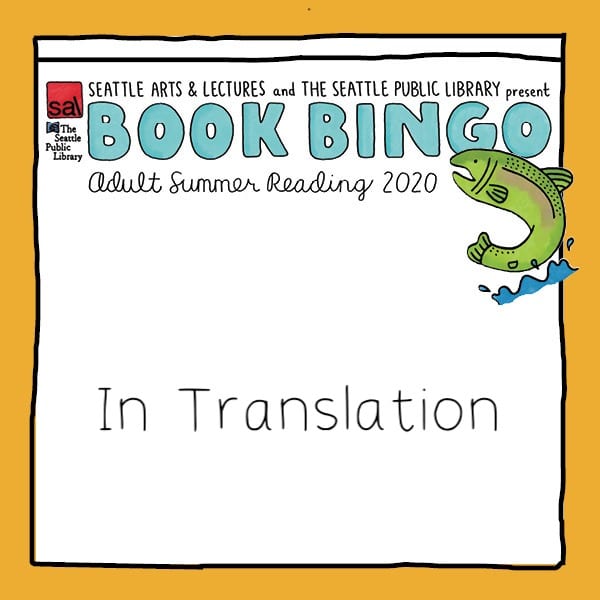
2020 Summer Book Bingo: In Translation
July 1, 2020
Sunshine is here and so is 2020 Summer Book Bingo, our free summer reading program with The Seattle Public Library! Download your card here. Get going on your summer reading now and aim for a bingo or blackout for a chance to win fabulous prizes. Engage with others and their own reading adventures by using the hashtag #BookBingoNW2020 on social media.
In this post, our Donor Relations Associate, Woogee Bae, explores the “In Translation” square with four book recommendations, plus a few bonus ideas. Read on for a fresh perspective on translation and “radical reimaginings” with these books.
By Woogee Bae, SAL’s Donor Relations Associate
“To be translated is to be possessed, possessed by a twin-spirit, a spirit of disobedience,” writes Seattle-based poet and translator Don Mee Choi in “ᄏ=q,” one of three short essays in the pamphlet Freely Frayed, ᄏ=q, & Race=Nation. Choi approaches translation as an active collaboration between the translator and the author-in-translation, both informing and inventing the other to reveal knowns and unknowns, rather than an invisible labor that insists on a fluent and faithful replicate. As a translator, Choi refuses fluency and faithfulness, and instead highlights the power imbalances between languages, countries, and histories (in particular, America’s ongoing violence overseas and locally). In an earlier passage, she writes, “My translation intent has nothing to do with personal growth, intellectual exercise, or cultural exchange, which implies an equal standing of some sort. South Korea and the U.S. are not equal. I am not transnationally equal.” Translation then becomes a work of anti-colonialism and -imperialism—two or more writers working collectively to “disobey” what is dominant and largely accepted, to reject the assimilationist idea of a perfect translation, an exact mold. Instead, they bring light to alternate ways of living, thinking, doing, and speaking.
Over the years, I’ve grown more interested in translated works because of Choi’s radical framing. Translation doesn’t—or shouldn’t—move in one direction, which implies an absorbing and erasing of the original language, but rather the languages should interweave, work in tandem, acknowledge imbalances, and open up spaces for possibilities and uncertainties and radical reimaginings. The books I’m sharing here do exactly that, and more.
The Autobiography of Death by Kim Hyesoon, translated by Don Mee Choi
I’ve been a longtime fan of the feminist poet Kim Hyesoon, for her peculiar, grotesque, at times violent imagery. This most recent collection, winner of the 2019 Griffin Poetry Prize, was written after the sinking of the Sewol Ferry in 2014, where more than 300 of the 476 passengers died, (250 of them were high school students on a field trip), and draws on several tragedies that happened in South Korea. The book takes us through forty-nine poems, one for each day the spirit wanders the world after death and before reincarnation, and though these poems are devastating, they invite us to rethink our deaths, which helps to rethink our living. What kind of life do we live, in the face of mortality? More connected, perhaps, and fully.
The Taiga Syndrome by Cristina Rivera Garza, translated by Suzanne Jill Levine & Aviva Kana
This is a fairy tale detective story like no other. An unnamed narrator is tasked with finding a woman who leaves her husband and follows another man into a taiga. The narrator and a translator then follow the breadcrumbs into the taiga, where the lines between fiction and reality start to blur significantly. Rivera Garza is an experimental writer, and The Taiga Syndrome subverts our expectations of what a story, and genre-writing, can be. Lines are repeated and rewritten over, sometimes obsessive or uncertain or ambiguous, and boundaries and borders (of all kinds) are broken down and redefined. When I was reading, I felt as if I was in the taiga myself—without any clear answer of how to escape. Strangely, it made reading it all the more delightful.
The Oasis of Now by Sohrab Sepehri, translated by Kazim Ali & Mohammed Jafar Mahallati
I’m especially interested in works that turn the ordinary into extraordinary, and this collection of poems pays careful attention to the scent of the garden, the plums and apricots on a fruit stand, the untied shoelace. Small, ordinary objects and senses might reveal a great grief, loneliness, or transformation. As Ali writes in the introduction, “In all of his work Sepehri risks everything to place himself in the most vulnerable emotional positions that he can… a smart and incisive yet tender examination of what is at stake for the individual in acts of travel and creation, both human and poetic.”
Spit Temple by Cecilia Vicuña, translated by Rosa Alcalá
Cecilia Vicuña is an artist of many mediums, and it’s appropriate that this is a book of not only poem translations but transcriptions of her oral performances, lectures, whispers, chants, and movements. The physical space of a room translated to a page to a gesture to a sound. The first section of Alcalá’s introduction is titled “Just What Is This Woman Doing?” and what Vicuña does is not what we expect. If translation demands anything from me, it demands a second look, to surrender my grasp on what I know to be certain. What will Vicuña do next? I have no idea.
Honorable Mentions:
Factory Girls by Takako Arai, translated by Jeffrey Angles, Jen Crawford, Carol Hayes, Rina Kikuchi, You Nakai, & Sawako Nakayasu
Where Europe Begins by Yoko Tawada, translated by Susan Bernofsky & Yumi Seldon
You Will Always Be Someone From Somewhere Else by Dao Strom, translated by Ly Thuy Nguyen
Want more Summer Book Bingo suggestions? Read Recommended by an Independent Bookstore—Part Two, Recommended by an Independent Bookstore—Part One, or check out these category deep-dives from the SAL staff have got us reading and ready: Recommended by a Friend, Afrofuturism, Uplifting, Nature, and On Your Shelf. You can also find more on The Seattle Public Library’s website.